
Screamadelica is the third studio album by Scottish rock band Primal Scream. It was first released on 23 September 1991 in the United Kingdom by Creation Records and on 8 October 1991 in the United States by Sire Records. The album marked a significant departure from the band's early indie rock sound, drawing inspiration from the blossoming house music scene and associated drugs such as LSD and MDMA. Much of the album's production was handled by acid house DJ Andrew Weatherall and engineer Hugo Nicolson, who remixed original recordings made by the band into dance-oriented tracks.

Give Out but Don't Give Up is the fourth studio album by Scottish rock band Primal Scream. It was released on 28 March 1994 in the United Kingdom by Creation Records and in the United States by Sire Records. It peaked at number 2 on the UK Albums Chart. Musically, it marked a massive departure from the psychedelic sound of their previous studio album Screamadelica (1991) into one influenced by classic rock and blues music. Its cover photo is a cropped version of Troubled Waters by American photographer William Eggleston. Eggleston included the album in his 2017 Pitchfork list of "the Music That Made Him a Photography Legend."
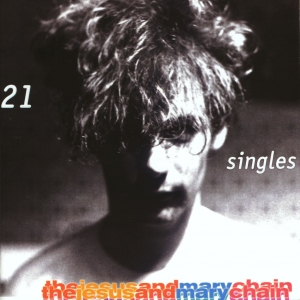
21 Singles is a compilation album by Scottish alternative rock band The Jesus and Mary Chain, released in the United Kingdom on 27 May 2002 by Warner Strategic Marketing, and in the United States on 2 July 2002 by Rhino Records. As the title proclaims, it contains 21 of the band's singles in chronological order from their 15-year career.

"Connection" is a song by Britpop group Elastica. It was originally released on 10 October 1994 as a single and included on their self-titled debut album in 1995. The song debuted and peaked at number 17 on the UK Singles Chart and became one of the few Britpop songs to gain popularity in North America, reaching number 53 on the US Billboard Hot 100, number two on the Billboard Modern Rock Tracks chart, and number nine on the Canadian RPM 100 Hit Tracks chart. In an interview with Zane Lowe, Damon Albarn mentions playing the synthesizer intro on a Yamaha QY10 handheld sequencer.

Flying Saucer Attack is an English space rock band formed in Bristol in 1992, led by songwriter David Pearce. Rachel Brook of Movietone was a member during the band's early incarnation; Other musicians contributing to the group's recordings and live performances included Rocker, Matt Elliott and Sam Jones.

Easy Action is the second studio album by the American rock band Alice Cooper, released by Straight Records in March 1970. The title comes from a line from one of the band's favorite films, the musical West Side Story. As with Pretties for You, the band's debut from the previous year, Easy Action was neither a commercial nor critical success. Singles include "Shoe Salesman" and "Return of the Spiders".

Slapp Happy is a studio album by German/British avant-pop group Slapp Happy, recorded at Virgin Records' Manor Studio in 1974.

Starlite Walker is the first studio album by indie rock group Silver Jews. It was released in 1994 as an LP and CD on Drag City (DC55) in America and on Domino (WIG15) in Europe.

Rock Bottom is the second solo album by former Soft Machine drummer Robert Wyatt. It was released on 26 July 1974 by Virgin Records. The album was produced by Pink Floyd's drummer Nick Mason, and was recorded following a 1973 accident which left Wyatt a paraplegic. He enlisted musicians including Ivor Cutler, Hugh Hopper, Richard Sinclair, Laurie Allan, Mike Oldfield and Fred Frith in the recording.
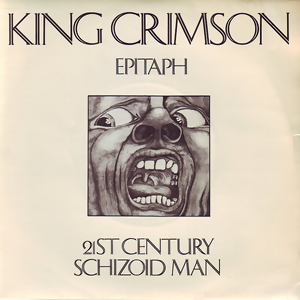
"21st Century Schizoid Man" is a song by the progressive rock band King Crimson, released in 1969 as the opening track on their debut album In the Court of the Crimson King. Often regarded as the group's signature song, it has been described by Rolling Stone as "a seven-and-a-half-minute statement of purpose: rock power, jazz spontaneity, and classical precision harnessed in the service of a common aim."

Heaven Born and Ever Bright is the third studio album by British rock band Cardiacs, released on 15 May 1992 through the band's label Alphabet Business Concern, originally marketed by Rough Trade and distributed by Rough Trade and Pinnacle. It was produced by Tim Smith, engineered by David Murder and mixed by both. Due to Rough Trade going bankrupt soon after the album's release, it was scarce until reissued in 1995. This reissue was remastered and given new cover art.
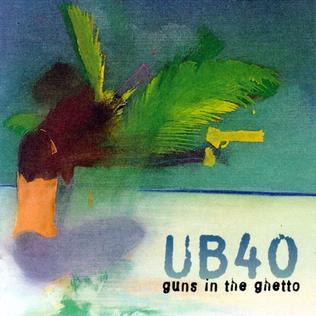
Guns in the Ghetto is a studio album by UB40. It was released in 1997 on the DEP International label.

The Seaside is the third demo album from English rock group Cardiacs. The album originally featured the second recording of what would become the band's only hit single, "Is This the Life?". It is the last of the band's releases to feature keyboard player/drummer/singer Mark Cawthra and the first to feature keyboard player William D. Drake.

Sampler is a compilation album by English rock band Cardiacs, released in 1995 by the Alphabet Business Concern.

Greatest Hits is a compilation album by the English rock band Cardiacs, released on 22 February 2002.

Kings of Oblivion is the third album by the UK underground group Pink Fairies, released in 1973.
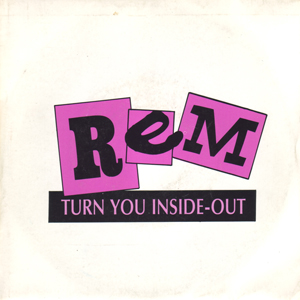
"Turn You Inside-Out" is a song by American rock band R.E.M. from their sixth studio album Green. Like all tracks on the album, it was written by group members Michael Stipe, Peter Buck, Mike Mills, and Bill Berry. The song's main guitar riff is an inversion of that used in "Finest Worksong". The recording also features percussion from former Sugar Hill Records house drummer Keith LeBlanc.

Maximum Darkness is the tenth album by the Welsh rock band Man and was released on the United Artists Records label September 1975. It was the second live album released by the band, excluding contributions to two "various artists" live albums, and featured John Cipollina as special guest. Rumours that Micky Jones had to over-dub Cipollina’s guitar, as it was out of tune, before the album could be released, are greatly exaggerated. Only one track, "Bananas", had to have his playing removed/replaced, per Deke Leonard: "Everything ... which sounds like Cipollina is Cipollina." The album spent two weeks in the UK album chart, peaking at No 25. It was the band's last release on United Artists, before moving to MCA Records.
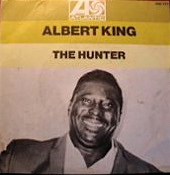
"The Hunter" is a blues song first recorded by Albert King in 1967 for his landmark album Born Under a Bad Sign. It was written by Stax Records' house band, Booker T. and the MGs, and Carl Wells. Along with "Born Under a Bad Sign" and "Crosscut Saw", "The Hunter" is one of King's best-known and most-recorded songs. In 1969, Ike & Tina Turner's version reached the singles charts in the U.S.

"Sympathy" is a song by the English progressive rock band Rare Bird. It became the band's only UK chart entry when it peaked at number 27 in the UK Singles Chart in 1970. The song reached No. 1 in Italy and in France, selling 500,000 copies in France and over one million globally. The song peaked at number 98 in Australia, becoming the group's only top 100 appearance there.



















